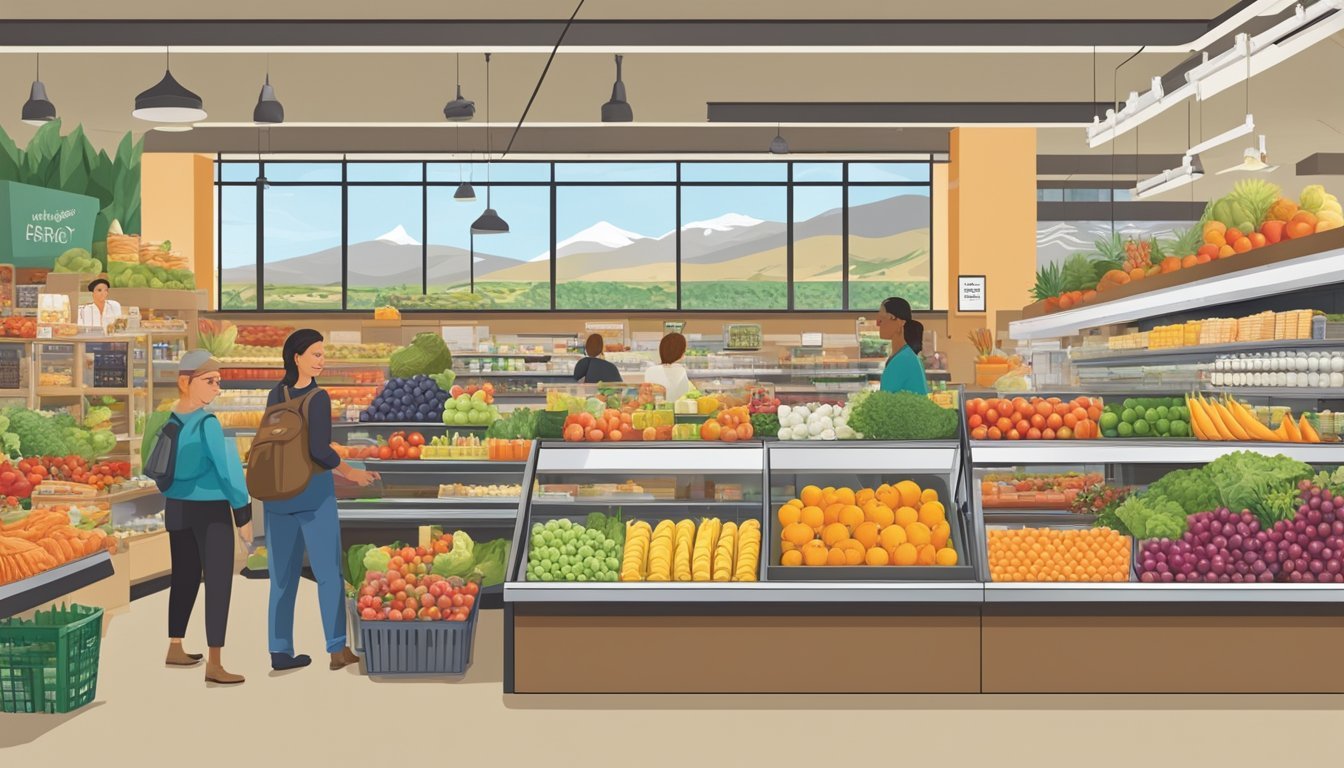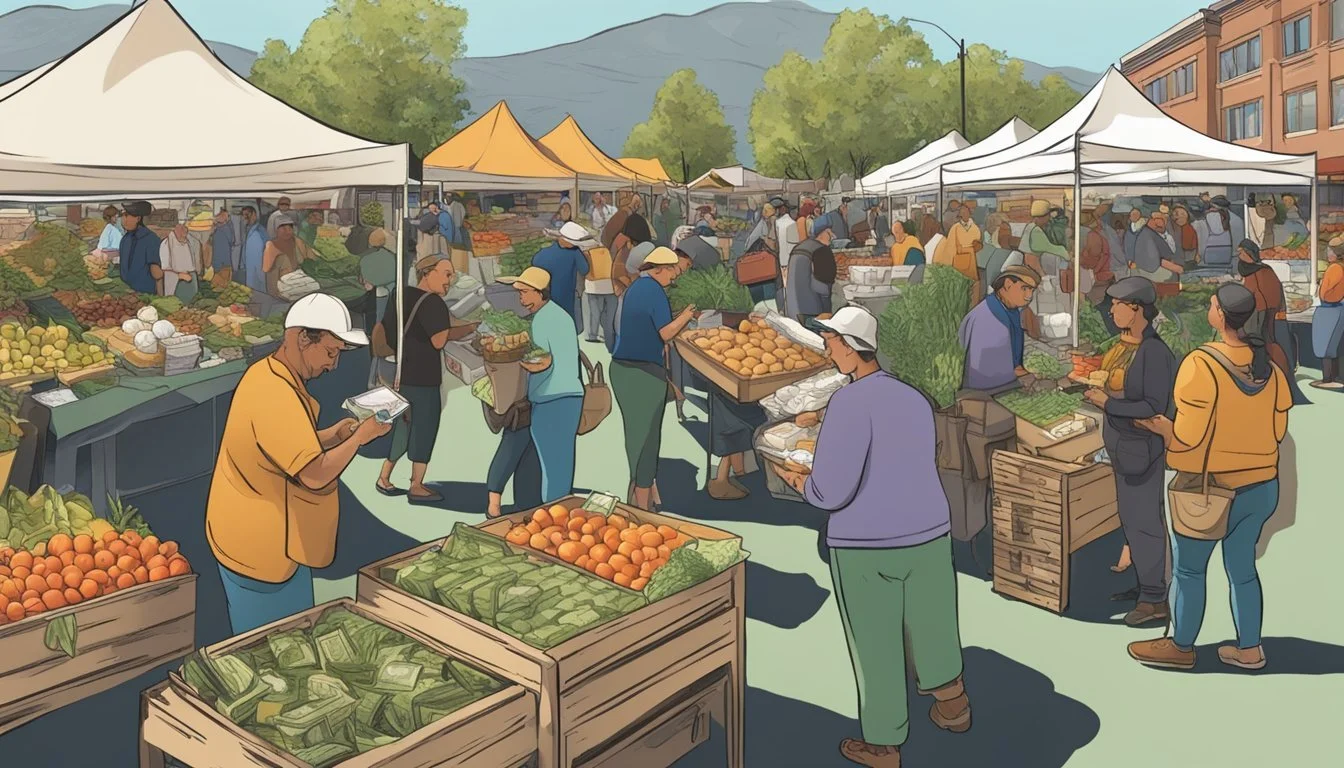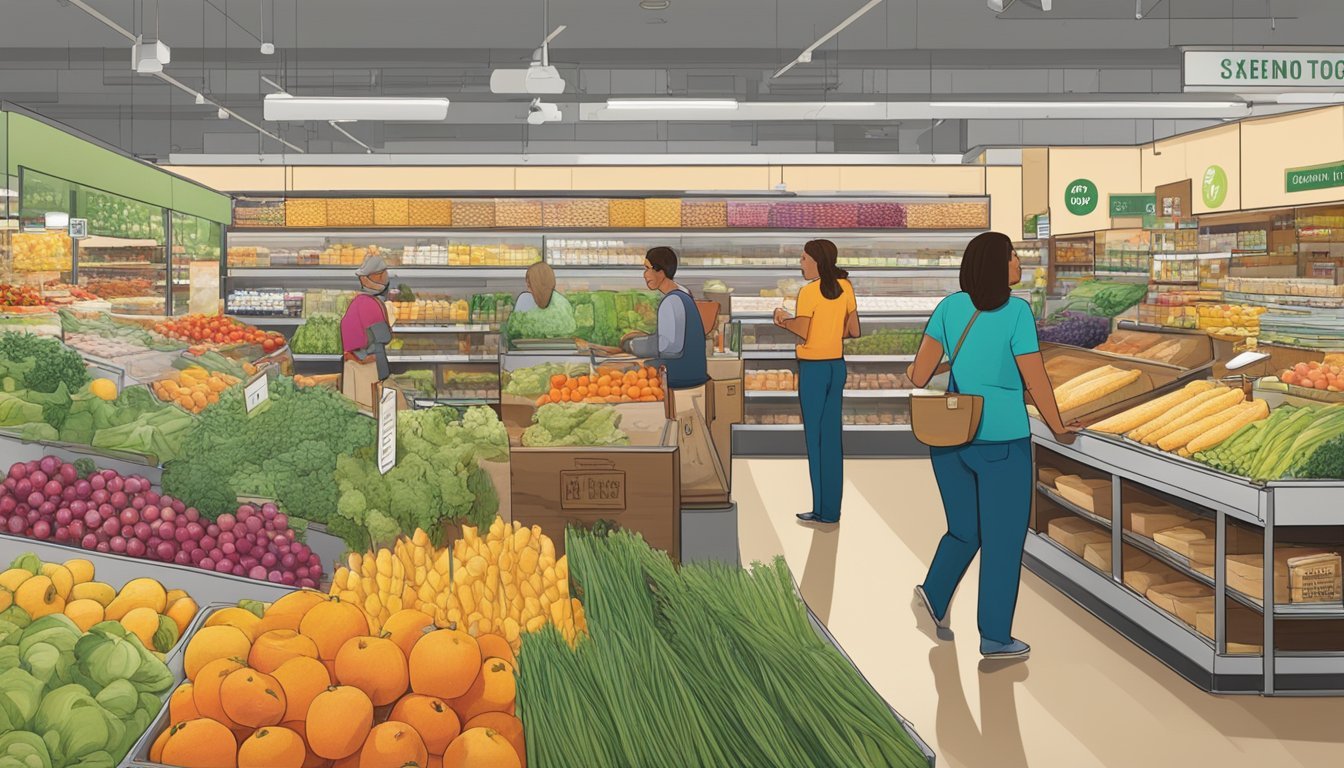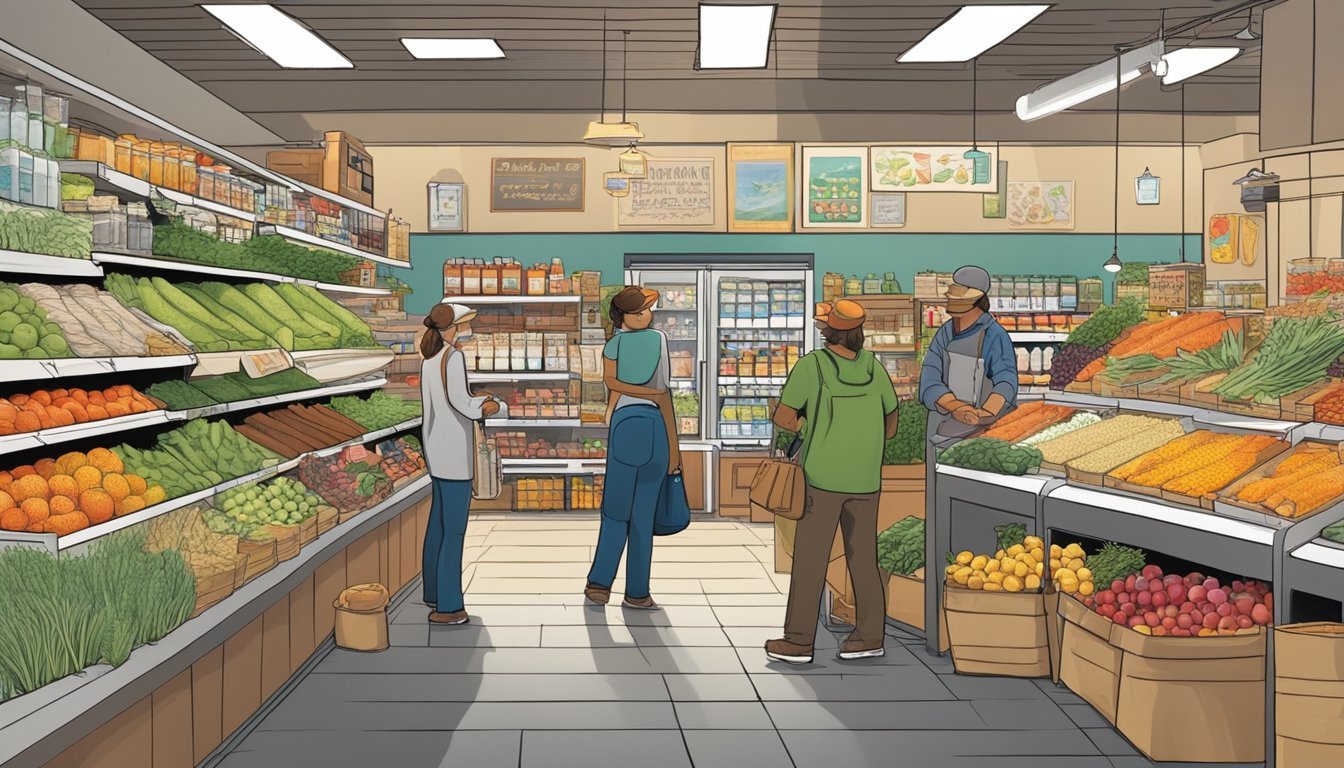Guide to Food Co-Ops in Reno, NV
Your Access to Local, Fresh Produce
Reno, Nevada, a vibrant city located near the Sierra Nevada mountains, offers a rich tapestry of culinary delights with a strong emphasis on community and sustainability. Food co-operatives in this region serve as cornerstones of the local food movement, providing residents and visitors with access to organic, sustainably-sourced produce, and artisan goods. These co-ops are more than just grocery stores; they are community hubs where people come together to support local farmers, promote healthful living, and contribute to a thriving regional food economy.
The Great Basin Community Food Co-op stands out as a prominent example of Reno's commitment to these values. As a community-owned market, it invites both members and non-members alike to partake in its vision for a fair and sustainable food system. With an emphasis on local, single-source products, it ensures that the food on the shelves not only nourishes the body but also supports the local community and its environment.
Through collaboration with small family farms and a dedication to community impact, food co-operatives in Reno exemplify a successful model of food distribution that prioritizes local needs and nurtures the region's food ecosystem. These co-ops strive to make high-quality, responsible food accessible to all, reinforcing Reno's reputation as a hub for those who value a connection between their food and its origins.
History and Philosophy of Food Co-Ops in Reno, NV
Food Co-Ops in Reno, NV, have a rich history rooted in the cooperative movement and are guided by principles that prioritize community and sustainability. They focus on local food systems and operate under a model that empowers member-owners.
Origins of Co-Operative Movement
The cooperative movement began as an endeavor to democratize food access and foster fair economic practices. In Reno, the Great Basin Community Food Co-op (GBCFC) exemplifies this philosophy. GBCFC started as a local food buying club, operated out of home kitchens, which has since evolved into a community cornerstone for accessing organic and sustainably-sourced produce.
Evolution of Reno's Food Co-Ops
As GBCFC grew, it aligned itself with the core cooperative principles, ensuring democratic member control and concern for the community. In 2012, they opened their doors at 240 Court St., a testament to their commitment to local food initiatives and sustainable cooperative growth. By offering a platform for regional and organic produce, they solidify the co-op's role in fortifying the local food system. Over the years, with strong community support, their operations have expanded, reflecting the viability and success of the cooperative business model in the Reno area.
Benefits of Joining a Food Co-Op
In Reno, NV, joining a food co-op offers a range of advantages from bolstering the local economy to accessing nutritious, locally-sourced food, and fostering a sense of community through shared educational experiences.
Supporting the Local Economy
Local Impact: Members of a food co-op directly stimulate the Reno economy by supporting local farmers and producers. This keeps money circulating within the community, benefiting local businesses and ensuring economic vitality.
Sustainable Practices: By prioritizing products from local sources, food co-ops help reduce the environmental impact associated with long-distance transportation of goods, fostering a more sustainable local food system.
Access to Organic and Wholesome Food
Quality Selection: Food co-ops often offer a diverse array of organic and sustainably-sourced produce, meeting the needs of health-conscious consumers seeking wholesome food options.
Affordability: While providing high-quality goods, co-ops strive to maintain affordability, making organic and nutritious food accessible to a broader segment of the community.
Community Building and Education
Inclusivity and Learning: Food co-ops serve as hubs for community building, where members can connect with like-minded individuals and partake in educational initiatives about healthy eating and sustainable living.
Collaboration: These community-owned grocery stores often host events and workshops that encourage collaboration and shared learning, reinforcing the ties between community members and the local food ecosystem.
Great Basin Community Food Co-Op (GBCFC) Overview
The Great Basin Community Food Co-op stands as a testament to the power of community and shared values in supporting local, organic food systems in Reno, NV. This co-op is a local mainstay for sustainably-sourced products and education on healthy lifestyles.
Membership and Equity
Great Basin Community Food Co-op operates on a member-owner model, where the community can buy a share of the co-op, granting them equity and a say in the co-op's operations. This model not only includes over 5,300 active member-owners but also allows for the distribution of profits back to the members and ensures that workers receive above-average compensation.
Products and Services
Products: GBCFC showcases a diverse range of products with a focus on organic produce, sourced from local farmers to ensure the highest quality and support for the surrounding community. Their services extend beyond groceries, incorporating a vibrant garden and educational resources aimed at training shoppers in sustainable practices.
Amenities: Customers visiting the co-op enjoy the convenience of parking facilities, allowing ease of access to the wide array of goods and services.
Community Events and Outreach
The co-op is a hub for community engagement with frequent events designed for outreach and education on creating a sustainable food system. They continually foster close ties with the Reno community by participating in local affairs and contributing to the local economy with notable annual sales figures. Through these efforts, GBCFC emphasizes the co-op's foundational goal: to build and sustain a thriving local community around quality food and fair business practices.
Shopping Experience at Reno's Food Co-Ops
When visiting Reno's Food Co-Ops, shoppers encounter a distinct atmosphere and a variety of amenities different from traditional grocery stores. These community-oriented spaces offer not just groceries, but also a place to connect with local culture and food systems.
Comparing Co-Op with Traditional Grocery Stores
Food Co-Ops in Reno distinguish themselves through a commitment to local and organic produce, creating a shopping experience centered on sustainability and community support. Unlike conventional grocery stores that may source their items from national or international suppliers, Co-Ops prioritize products from local growers and artisans. These establishments typically offer an array of organically grown, sustainably-sourced produce, that underlines their dedication to clean and fair food practices.
Here are some specific contrasts between Co-Ops and traditional grocery stores in Reno:
Produce: Food Co-Ops are known for their locally sourced, fresh organic produce, while traditional stores may carry a mix of local and imported items, often with a focus on cost-effectiveness over the source.
Owner structure: Traditional grocery stores are generally corporate-owned whereas Co-Ops are owned and operated by community members, which reflects in the quality and origin of the food they provide.
Community involvement: Co-Ops often act as hubs for local activities and education about sustainable food practices, which is less common in mainstream grocery stores.
Exploring In-Store Amenities
The in-store amenities at Reno's Food Co-Ops extend beyond the shelves of groceries. Many of these establishments feature a cafe or kitchen area, allowing customers to enjoy prepared foods made with the same organic and local ingredients sold in the store. This offers a taste of the community's local culture and cuisine, integrated into the shopping experience.
Here are some of the amenities one might find:
Cafe/Kitchen: A spot to savor freshly made, organic meals or to grab a quick, nutritious bite.
Public Seating: Areas for customers to dine in, meet with friends, or relax before and after shopping.
Parking: Co-Ops generally provide a parking lot, although space might be more limited in comparison to larger, traditional grocery stores.
Each of these in-store features is designed to emphasize the community feel, promote local produce, and create a welcoming environment for all patrons.
Economic Impact of Food Co-Ops on Reno
Food cooperatives in Reno have become pivotal in supporting the local economy by bolstering small businesses and contributing to sustainability and environmental initiatives.
Small Business Growth
Food co-ops in Reno, like the Great Basin Community Food Co-op, play a significant role in fostering small business growth. These cooperatives often source from local food producers, offering a marketplace for organic and sustainable products. By prioritizing goods from local vendors, co-ops help circulate money within the local economy, benefiting producers, farmers, and the community at large. Restaurants in downtown Reno also benefit from this model, as it provides access to a diverse selection of local, organic produce which supports their efforts to serve fresh and sustainable meals.
Sustainability and Environmental Contribution
The sustainability and environmental contributions of Reno food co-ops reflect a commitment to a sustainable cooperative model. By promoting local and sustainable food systems, these co-ops help to reduce the ecological footprint associated with transportation and unsustainable farming practices. The emphasis on sustainably-sourced produce supports both environmental health and ensures the provision of affordable and healthy food options to Northern Nevada. This stewardship not only aligns with broader ecological goals but also ensures sustainable growth for the local economy and the community as a whole.
Guidelines for Starting Your Own Co-Op in Reno
Reno presents a unique opportunity for the establishment of community-driven, sustainable cooperatives. The journey to starting a co-op involves several key steps, and understanding the legal framework is essential for sustainable success.
Steps to Establish a New Co-Op
Conceptualize Your Co-Op: Initiate by defining the co-op's mission, the needs it will serve in the community of Reno, and the cooperative principles it will uphold, such as voluntary and open membership, democratic member control, and concern for community.
Develop a Business Plan: Construct a robust business plan that outlines the co-op's financial model, marketing strategies, and long-term sustainability goals.
Engage the Community: Gather support from the local community through meetings, surveys, and the formation of a core group of founders who share a vested interest in the co-op's success.
Raise Capital: Determine the co-op's capital needs and raise funds through member investments, loans, and grants.
Find a Location: Secure a suitable location in Reno that is accessible to the community and adequate for the co-op's operations.
Organize Governance: Set up a transparent and democratic governance structure that includes a board of directors and a clear set of bylaws.
Legal and Regulatory Considerations
Incorporation: The co-op will need to be incorporated according to Nevada state laws, which includes drafting and filing articles of incorporation.
IRS Compliance: Obtain a federal employer identification number (EIN) from the IRS and understand the tax obligations specific to cooperatives.
State Specific Requirements: Comply with any additional state-specific regulatory requirements, such as business licenses and permits for operation in Reno.
Labor Laws: Ensure adherence to both federal and Nevada state labor laws and regulations, which govern employment practices within the co-op.
Profiles of Local Reno Food Co-Ops
Reno prides itself on fostering a robust local food system through various community-oriented food co-ops. These co-ops emphasize sustainable farming practices, organic produce, and the promotion of local farmers and artisans.
Great Basin Community Food Co-Op
Address: Reno, NV 89501
Phone: (775) 324-6133
Website: www.greatbasinfood.coop
The Great Basin Community Food Co-op (GBCFC) stands as a pillar of the Reno community, notable for its commitment to organic and sustainably-sourced products. Anyone can shop at the GBCFC, though membership offers additional benefits. This co-op's assortment ranges from organic vegetables to artisanal goods, grounding itself as a crucial component of the local food system. They are consumer-owned and prioritize fair trade, offering educational resources and community-building opportunities.
Products: Organic produce, local meats, sustainable seafood, pastured chicken and eggs, dairy, vegan alternatives, gluten-free and paleo options
Specialty: Raw items, biodynamic and organic wines, craft beers
Community Involvement: Educational programs, support for local farmers, renovation projects to expand community space
Other Notable Co-Ops in the Area
While the Great Basin Community Food Co-op is a central figure in Reno's local food scene, other co-ops in the surrounding area also contribute to the rich tapestry of Northern Nevada's food culture.
Tahoe Food Hub
Located within 150 miles of North Lake Tahoe, this co-op focuses on the principle of providing access to sustainably grown food from small, family-owned farms. It also supports community programs, with the local food marketplace proceeds benefiting area-specific impact initiatives. The Tahoe Food Hub underscores the importance of a locally centered food economy.
Services: Sells produce from family farms, promotes sustainability
Area of Benefit: North Lake Tahoe and surrounding communities
The Truckee area also features a community-led initiative, born out of a desire to connect consumers directly to the source of their food, building trust and transparency within the local food web. This food co-op plays a crucial role in fostering relationships between residents and nearby growers.
In summary, these food co-ops serve as crucial nodes in the connection between Reno and its surrounding regions, working collectively to sustain a vibrant, fair, and environmentally conscious food network.
Promoting Co-Ops Through Partnerships and Events
Food co-ops in Reno, NV, benefit greatly from partnerships with local businesses and the organization of seasonal and annual events. These collaborations and events serve as crucial tools for fostering community engagement, education on sustainable cooperatives, and bolstering annual sales.
Collaborations with Local Businesses
Food co-ops often partner with local farmers and businesses to offer a range of locally-produced, sustainable products to their members. These partnerships often involve:
Direct procurement: This close relationship ensures that co-ops can provide fresh, seasonal produce directly from the farm to the consumer's table, supporting the local economy.
Educational workshops: Local experts may be invited to teach co-op members about sustainable farming practices and the nutritional benefits of locally-sourced food.
Seasonal and Annual Co-Op Events
Co-ops frequently host events to engage with the community and to celebrate the co-op's accomplishments. These events might include:
Seasonal Harvest Festivals: These festivals mark the change of seasons with fresh, local produce and are an opportunity for farmers to connect directly with co-op members.
Annual General Meetings (AGMs): AGMs are essential for members to learn about the co-op's performance, including annual sales figures, and to have a say in future initiatives.
By engaging in these partnerships and events, food co-ops in Reno contribute to the creation of a vibrant, educated, and sustainable cooperative community.
Future of Food Co-Ops in Northern Nevada
The landscape for food co-ops in Northern Nevada is shifting with a focus on sustainable practices and community outreach. The following subsections will explore the trajectory of food co-ops with regard to innovation and extending their presence in the region.
Trends and Innovations
Food cooperatives in Northern Nevada are increasingly turning towards sustainable models that prioritize local and organic produce. The Great Basin Food Co-op has set a precedent in providing a platform for local farmers to present their organic products to a community-oriented customer base. Innovations also include leveraging technology to improve supply chain efficiency, reducing waste, and enhancing the shopper's experience.
Local Sourcing: Food co-ops are bolstering the local economy by providing farmers with reliable marketplaces to sell their goods.
Sustainability Measures: Initiatives such as single-source clean food and sustainable cooperative models demonstrate a commitment to the environment and economy.
Organic Focus: An emphasis on organically grown products meets consumer demand for healthful eating choices.
Expanding the Reach of Co-Ops
Expansion of food co-ops within Reno and across Northern Nevada is not only about opening new locations but also about strengthening the relationship with the community and making sustainable, affordable options more accessible.
Community Engagement: Education regarding the benefits of a sustainable cooperative is integral in gaining support for existing and future co-ops.
Affordability: Maintaining affordability is crucial in ensuring that all community members have access to high-quality, organic produce.
Ownership Model: As community-owned entities, co-ops empower citizens, giving them a stake in the economic health of the area, and allow for a more democratic retail experience.
Through these efforts, food co-ops in Northern Nevada look to further their mission of supporting local, sustainable agriculture, contributing to a healthier community and a robust local economy.
Conclusion
Food co-ops in Reno, Nevada serve as vital hubs for the community, providing more than just a place to purchase groceries. They embody a commitment to sustainability, local food sourcing, and education on healthy eating practices. Great Basin Food Co-op stands out as a shining example of how a cooperative can influence and strengthen the community's bond with local farmers and artisans.
Organic produce and sustainably-sourced products are staples at these co-ops, ensuring that consumers have access to high-quality and environmentally friendly options. These organizations take pride in offering food that is not only good for the people but also for the planet. Education initiatives are often a part of a food co-op's mission, as they strive to inform members and shoppers about the benefits of organic and local food choices.
Moreover, such sustainable cooperatives contribute significantly to the local economy. The presence of food co-ops like Great Basin supports small family farms and businesses within a 150-mile radius, and their success is a testimonial to the viability and value of this business model in Reno's vibrant community.
Participating in a food co-op is a conscious decision to be a part of a larger, collective effort to promote a healthier lifestyle and a more resilient local food system. It is clear that the food co-ops in Reno are more than just grocery stores—they are a cornerstone for a thriving, informed, and connected community.
References
Great Basin Community Food Co-op serves as a cornerstone in Reno, NV for those seeking organic, local, and sustainably-sourced produce and goods. For research and further information about the co-op, the following sources are invaluable:
Great Basin Community Food Co-op
Website: greatbasinfood.coop
Contact: +1 775-324-6133
Address: 240 Court St, Reno, NV 89501, United States
Operational Hours: Open daily from 7:30 AM to 9:00 PM
Articles & Online Presence
Farm to Table Initiatives in Reno-Tahoe
Insight into the co-op's start, evolving from a garage gathering to a fully-fledged store
Community Involvement and Impact
The co-op enhances the health of the local environment and economy
It adheres to a business model based on community and sustainability rather than profit maximization
For those interested in becoming a part of the co-op, either as a member or shopper, the mentioned website and physical location are the primary points of reference. They emphasize the co-op's commitment to ethical food sourcing, community-building, and environmental stewardship.









